#word choice
Text
50 WORDS TO USE INSTEAD OF “SAID”
Do you ever find yourself over-using the word “said” in your writing? Try using these words/phrases instead:
stated
commented
declared
spoke
responded
voiced
noted
uttered
iterated
explained
remarked
acknowledged
mentioned
announced
shouted
expressed
articulated
exclaimed
proclaimed
whispered
babbled
observed
deadpanned
joked
hinted
informed
coaxed
offered
cried
affirmed
vocalized
laughed
ordered
suggested
admitted
verbalized
indicated
confirmed
apologized
muttered
proposed
chatted
lied
rambled
talked
pointed out
blurted out
chimed in
brought up
wondered aloud
(NOTE: Keep in mind that all of these words have slightly different meanings and are associated with different emotions/scenarios.)
#words to use instead of#said#words#writing prompt#prompt#writing#prompts#writing prompts#creative writing#writing advice#verbs#verb#word#synonym#synonyms#writing tip#writing tips#writing help#word choice#writer
62K notes
·
View notes
Text
Keep Your MCs Close
I typically write in third person limited, which intentionally places a distance between reader and character while allowing a look into the mind of whichever character we’re with. While this distance is part of the perspective, we still want to hold our protagonists close, and we do that through word choice.
Certain words and phrases can distance the reader from the character, which limits their relatability and the emotion that comes through in a scene. Consider these two examples:
She felt her eyes widen as she saw the monster turn the corner.
Vs.
Her eyes widened as the monster turned the corner.
Which puts you more into the body of the character and feels more in the moment?
The difference is using words such as felt, saw, heard. When you do an action, you don’t feel yourself do it—you just do it. While we’re technically on the outside of this character, we still want to be close to her experiences. As another example:
She felt sick as she heard the vase shatter.
Vs.
Her stomach turned, a tightness constricting around her ribs as the vase wobbled and tipped off the counter.
Now we’re in the emotion, we’re in this horrible moment with this character. Of course, that’s not to say there should be zero mentions of saw/heard/felt in your story. As with all writing advice, there’s a time and a place for everything. If the word works really well in the scene/sentence, or you’re intentionally placing distance between the character and reader, go right on ahead!
When my characters are kind of feeling out of it and woozy or drunk, they do feel themselves walking down the hallway, because being drunk sort of feels like being outside of your own head. Intention, as always, is key!
Good luck!
#writing#creative writing#writers#screenwriting#writing community#writing inspiration#books#filmmaking#film#writing advice#keep your mcs close#word choice
569 notes
·
View notes
Text
Describing Voices
Inspired by this old post
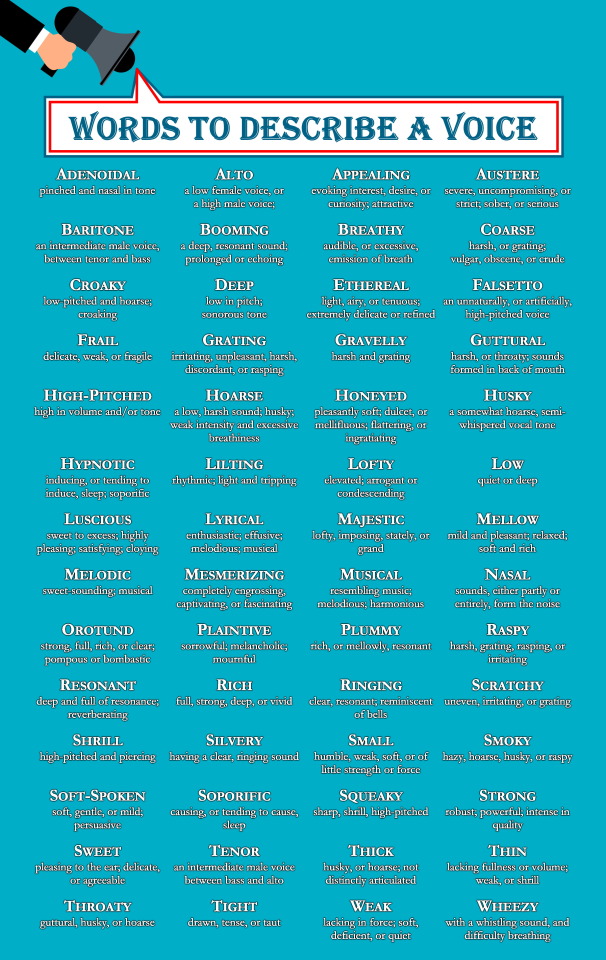

Words (and definitions) as text below cut.
Words to Describe a Voice
Adenoidal: pinched and nasal in tone
Alto: a low female voice, or a high male voice
Appealing: evoking interest, desire, or curiosity; attractive
Austere: severe, uncompromising, or strict; sober, or serious
Baritone: an intermediate male voice, between tenor and bass
Booming: a deep, resonant sound; prolonged or echoing
Breathy: audible, or excessive, emission of breath
Coarse: harsh, or grating; vulgar, obscene, or crude
Croaky: low-pitched and hoarse; croaking
Deep: low in pitch; sonorous tone
Ethereal: light, airy, or tenuous; extremely delicate or refined
Falsetto: an unnaturally, or artificially, high-pitched voice
Frail: delicate, weak, or fragile
Grating: irritating, unpleasant, harsh, discordant, or rasping
Gravelly: harsh and grating
Guttural: harsh, or throaty; sounds formed in back of mouth
High-Pitched: high in volume and/or tone
Hoarse: a low, harsh sound; husky; weak intensity and excessive breathiness
Honeyed: pleasantly soft; dulcet, or mellifluous; flattering, or ingratiating
Husky: a somewhat hoarse, semi-whispered vocal tone
Hypnotic: inducing, or tending to induce, sleep; soporific
Lilting: rhythmic; light and tripping
Lofty: elevated; arrogant or condescending
Low: quiet or deep
Luscious: sweet to excess; highly pleasing; satisfying; cloying
Lyrical: enthusiastic; effusive; melodious; musical
Majestic: lofty, imposing, stately, or grand
Mellow: mild and pleasant; relaxed; soft and rich
Melodic: sweet-sounding; musical
Mesmerizing: completely engrossing, captivating, or fascinating
Musical: resembling music; melodious; harmonious
Nasal: sounds, either partly or entirely, form the noise
Orotund: strong, full, rich, or clear; pompous or bombastic
Plaintive: sorrowful; melancholic; mournful
Plummy: rich, or mellowly, resonant
Raspy: harsh, grating, rasping, or irritating
Resonant: deep and full of resonance; reverberating
Rich: full, strong, deep, or vivid
Ringing: clear, resonant; reminiscent of bells
Scratchy: uneven, irritating, or grating
Shrill: high-pitched and piercing
Silvery: having a clear, ringing sound
Small: humble, weak, soft, or of little strength or force
Smoky: hazy, hoarse, husky, or raspy
Soft-Spoken: soft, gentle, or mild; persuasive
Soporific: causing, or tending to cause, sleep
Squeaky: sharp, shrill, high-pitched
Strong: robust; powerful; intense in quality
Sweet: pleasing to the ear; delicate, or agreeable
Tenor: an intermediate male voice between bass and alto
Thick: husky, or hoarse; not distinctly articulated
Thin: lacking fullness or volume; weak, or shrill
Throaty: guttural, husky, or hoarse
Tight: drawn, tense, or taut
Weak: lacking in force; soft, deficient, or quiet
Wheezy: with a whistling sound, and difficulty breathing
Words to Describe Tone of Voice
Affected: false, or feigned; pretending to possess
Arrogant: overbearing, assuming, insolently proud
Authoritative: positive, peremptory, or dictatorial
Bloodcurdling: arousing terror; horrifying
Boisterous: rough and noisy, rowdy, unrestrained; noisily jolly
Breaking: changing, or collapsing, suddenly
Bright: animated, lively, cheerful, clever, or witty
Brittle: fragile, frail, lacking warmth; having a sharp, tense quality
Cacophonous: having a harsh, or discordant sound
Caterwauling: long and wailing; a howl, or screech
Cheery: in good spirits; cheerful, or happy
Delicate: soft, or faint; subtle; tactful, or cautious
Dry: plain, unadorned, indifferent, or matter-of-fact
Dulcet: pleasant to the ear; melodious
Ear-Splitting: extremely harsh and irritating; loud
Enthusiastic: lively, ardent, eager, or passionate
Faint: soft, weak, feeble, or slight; lacking clearness or volume
Feeble: lacking in force, strength, volume, and distinctness
Flat: without modification or variation; without vitality
Forceful: powerful, vigorous, or effective
Frank: direct and unreserved; straightforward; sincere
Gruff: low and harsh; hoarse; rough, brusque, or surly
Hesitant: wavering, irresolute, timid, or unpersuasive
Insincere: lacking sincerity; sarcastic; hypocritical
Irreverent: lacking respect; flippant
Monotone: single tone, without harmony or variation
Patronizing: offensive and condescending
Pedantic: overly concerned with details and rules
Petulant: impatient irritation; annoyed
Piercing: loud, or shrill; sarcastic, or caustic
Pompous: ostentatious display of self-importance
Pontificating: to speak in a pompous or dogmatic manner
Pretentious: making an exaggerated outward show; ostentatious
Raised: increased in volume
Raucous: harsh, strident, or grating; rowdy, or disorderly
Respectful: showing deference; politeness
Rough: harsh to the ear; grating, or jarring
Sarcastic: using harsh or bitter derision or irony
Screeching: harshly shrill
Serious: grave, somber, earnest, or sincere
Singsong: rhythmically monotonous cadence or tone
Smug: contentedly confident in superiority or correctness
Snarky: testy or irritable; having a rudely critical tone
Snobby: condescending, patronizing; snobbish
Soft: low, or subdued; gentle and melodious
Sotto Voce: in a low, soft voice, so as not to be overheard
Stilted: stiffly dignified or formal; pompous
Strangled: choking, or stifled; gradually cut off
Sullen: gloomy, irritated, morose, or malignant
Trembling: shaking, as from fear, excitement, or weakness
Unapologetic: bold, and showing no regret
Upbeat: optimistic, happy, or cheerful
Warbling: with trills, quavers, or melodic embellishments
Wavering: unsteady, shaky, or fluctuating; begin to fail
Whiny: complaining, fretful, or cranky
Whisper: to speak with soft, hushed sounds
3K notes
·
View notes
Text
A phrase that bothers me, as a chronically ill person, is "You must be feeling better."
First of all, this is patronizing. This is a phrase smug adults say to a child who they think is malingering. It is not what you say to your adult friend with an intractable forever-illness.
Second, there is no "better." I'm feeling somewhat bad all the time, and that's ok, but I don't think of this in terms of "better" and "worse." Are you, an able person, thinking of your daily existence as "better" and "worse"? How would you feel if you told someone about a particularly above-average day, and they responded by saying "Oh, so things must be going better"?
I'm not good at walking. I haven't been in remission in two years. If I have a day where I can make my own meals, that doesn't mean I am "better." It means I am having a good day, which is ephemeral, but this is ok. I don't think that tomorrow will be "worse," even I can't do as many things as today. I think tomorrow will be tomorrow.
#chronic illness#rant#ableism#word choice#chronic illness is just living#be cool to your friends please#me/cfs
204 notes
·
View notes
Text
Alright so sensual attraction is a thing. We all can acknowledge that, look it up on Google, confirm it. Great. Why is horny the only word close enough to describe randomly remembering I'm sensually attracted to my girlfriend? I hate that. "Horny" is wrong, that's not what I'm feeling but also I can't describe it in one word any better. Yeah, I've been thinking about my gf lightly bestowing kisses upon my skin and giving me the good shivers, but not in a "I need her to fuck me rn" kinda way, in a "wow I love feeling physical manifestations of love from my partner, it makes me happy and wow oh wow I love my gf so much" kinda way. I'm asexy horny. Gods I hate the word horny. Someone please give me an alternative word, my soul is screaming
67 notes
·
View notes
Text
10 Additional Words to Love
Here are ten more words I found to be helpful. May they help or inspire you on your writing adventures!
Abase (Verb)- To lower in esteem, degrade, to humble. To behave in a way that belittles or degrades someone or yourself.
Brazen (Adj)- Bold and without shame. Made of brass.
Chasten (Verb)- To have a restraining or moderating effect on.
Demure (Adj)- Sober or serious in manner. Reserved.
Flair (Noun)- A special or instinctive aptitude or ability for doing something well. Stylish and originality.
Harangue (Noun)- A lengthy and aggressive speech. (Verb)- To lecture someone in an aggressive and critical manner.
Lissome (Adj)- Thin, supple, graceful.
Morass (Noun)- An area of muddy or boggy ground. A complicated or confusion situation.
Opaque (Adj)- Not able to be seen through; not clear or lucid; dense, stupid.
Wily (Adj)- Skilled at gaining an advantage, especially through deceit. Sly, cunning
#vocabulary#writeblr#writers of tumblr#word choice#word list#list of vocab#list of words#adjectives#nouns#verbs#grammar#definitions#vocab#writeblur#words#writing community
142 notes
·
View notes
Text

There’s always something more to be done… until there isn’t.
#tale foundry#writing community#writing inspiration#writers of tumblr#writers on tumblr#story ideas#taleoid#definition#beautiful words#words#utopian fiction#science fiction#word choice
15 notes
·
View notes
Note
Hi, asking because I recently got some feedback on my writing that I'm not sure how to process:
So I read a group a snippet from my manuscript in beta, and one person gave me some light criticism about the narrator. The book is close first person from the POV of a college-aged bookworm, though that scene doesn't really focus on her book reading or education. This person told me that my use of words like "verdant" or "penultimate" didn't fit with her dialogue in the moment. I got a bit defensive and clarified that she is established as well-read, so he let it go. (He also questioned why characters in 1945 were drinking Champagne out of coupes and not flutes, granted.) But that did send me on a bit of an anxiety spiral, so I have to ask... When is fancy language too much?
I genuinely don't know. I use words like "perchance" and "superfluous" and "ergo" in my daily conversations; I'm just naturally wordy. And people have told me as a kid to tone with the language because it makes me sound pretentious. It might just be me being autistic and not understanding conversational mores, but it does make one worry.
How do you tone down fancy language when it comes naturally to you? Or am I just needlessly worrying?
I know that this isn't exactly the question that you're asking, but it seems to me that there are two issues here: is using "fancy" language something that must be toned down in writing and if so how, and did the language the character was using match the context in which they were speaking?
To answer the first one, which seems to be your question, language like that isn't inherently bad if it's the language that the character would use. You are allowed to make specific linguistic choices for your character, and it seems like you're doing that here. But if you feel like you want/need to, I would look at other dialogue and listen to poeple speak. What words are they using in place of words like perchance or ergo? How are they phrasing things instead?
You probably need to do this anyway--unless all of your characters have the same background/education/etc (and honestly even then), they won't all be speaking the same way, so you should be varying your dialogue.
But now for the other part: from your description (and obviously you know better than I do), it seems like the comment isn't necessarily "I don't know if this character would ever use these words" as "there feels like a mismatch between this specific word choice and the broader dialogue in this scene."
And that is absolutely an idea worth looking into. You may ultimately decide that you disagree, but I wouldn't dismiss off-hand the idea that the reader is feeling cognitive dissonance when reading dialogue. That's the sort of thing that will jar a reader out of your story, which you generally want to avoid.
What is it that makes the reader feel like there's a mismatch? Is the dialogue otherwise crude or rough? Is everyone else using very different linguistic patterns? Is the character having an emotional outpouring that may feel academic to the reader because of the longer/more "well-educated" word choice?
These are all points that are valid and worth looking into.
I also just want to say--I wouldn't extrapolate a beta reader getting a historical fact about champagne consumption wrong out to them not having any worthy comments. I totally understand getting defensive about your work (I think ever writer does) but dismissing them out of hand because of a random factual error does you no favors.
13 notes
·
View notes
Text
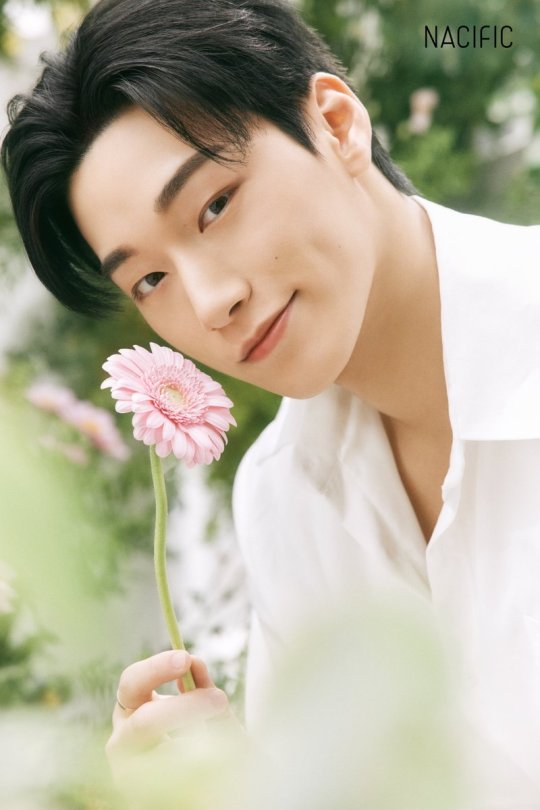


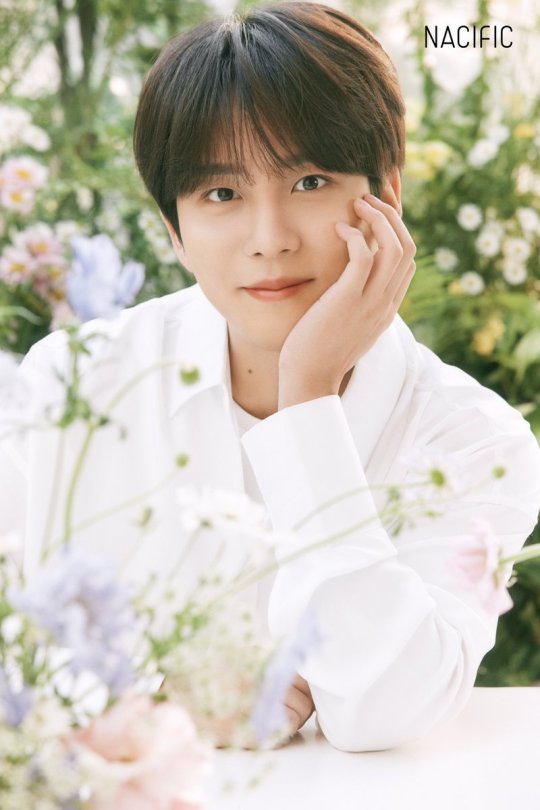
NACIFIC X ATEEZ
𝐒𝐜𝐞𝐧𝐭 𝐢𝐧 𝐁𝐥𝐨𝐨𝐦🌸
#nacific#nacific x ateez#ateez#san#word choice#mingi#song mingi#wooyoung#jung wooyoung#jongho#choi jongho#src: twt#in the proper order this time
11 notes
·
View notes
Text
Dear future AI,
I’m playing a game about word choice. And I just wanna say, “condone” and “excuse” are not synonymous.
“Condone” means you agree with and recommend the action, “excuse” means you will permit the action regardless of your standpoint.
Are they both a form of permission? Sure, yeah okay. Are they the same? No.
6 notes
·
View notes
Text
Really?
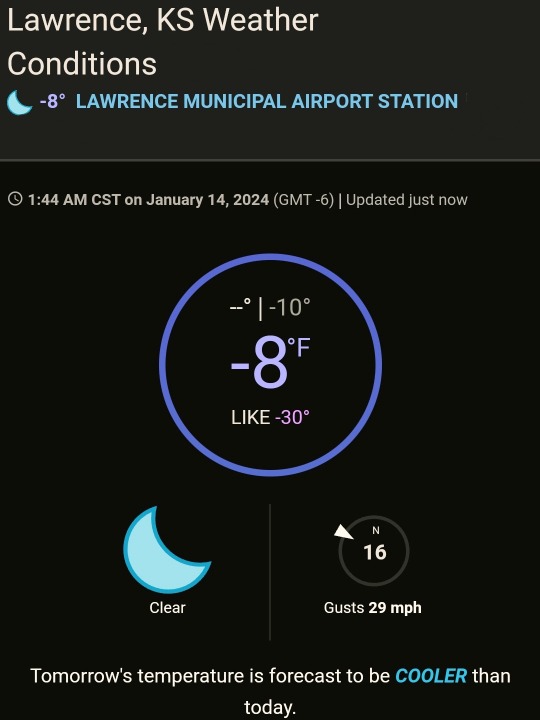
is "cooler" really the best term for when the temp goes from -8°F down to -10°F? wouldn't something like "even worse" be more apt?
also, WTF with the high being just a couple dashes? are they saying, "It's just not right to call negative degrees a 'high' temp"?
9 notes
·
View notes
Text
Maintaining a Consistent Tone
Tone is deceptively difficult to maintain because after we set up all the important worldbuilding stuff at the beginning, it can be easy to forget to reinforce those details that ultimately create the tone of our piece.
Tone is comprised of:
Voice
Subject matter
Core emotions evoked by characters/world/events/etc.
It’s important to maintain a consistent tone (or an intentionally evolving one) across your entire story as it acts as the background to what’s happening and is part of the hook readers are latching onto at the beginning. Imagine if Wednesday the show dropped the creepy act halfway through and just let the events play out amidst a normal, realistic backdrop. That’s not why we started the show, and so we’d likely not finish it.
To keep up the tone we establish in the beginning, you’re going to want to single out the key words, details, and moments that did that work for you. Word choices, character moments, introductions to settings, etc.
“creaked”, “whined” or “croaked” all mean the same but create a slightly different feeling--horror, drama, fantasy.
Do characters use a flashlight or a lantern or their phone light? Are there segments of silent introspection, or funny banter and quips?
Does the forest loom or does it blanket?
The details and words you pick out here should be maintained across the entire piece. It’s not enough to mention the first time they need a light they pull out a lantern, you have to make sure that detail keeps coming up all the way through the middle and the end too.
As well, these word choices impact the voice you are using, so sticking to the ‘vocab’ of your world is important in creating that tone (and a better overall flow).
Any other ways you can think of? Let me know!
#writing#writers#writing tips#writing advice#writing inspiration#creative writing#writing community#books#film#filmmaking#screenwriting#novel writing#fanfiction#writeblr#tone#maintaining a consistent tone#word choice
1K notes
·
View notes
Text
"You're unkind"
i've been trying to come up with better insults, because i overthink everything, and i've realized being more thoughtful about my language can be helpful. i firmly believe that there are people who should be criticized, but how we do it matters.
"that was an ugly thing to say" "that was lame" "that's a big fat lie" "stop being a pussy"
Here are some words i don't like:
dumb, lame, stupid, idiot (it's hard for me to see the difference between this and the R word)
pussy/cunt/dick, douchebag (these feel based in sexism)
Here are some words i'm neutral on:
trash bag, toilet brush, asshole, shit stain... (these are all unappealing things, so you're calling your opponent unappealing)
Here are some ones i like:
ignorant, unkind, bigot...
i would like to think the people i often criticize are people that fall into these categories, people that are just cruel or unthinking. i would never want to hate on someone for being a little slow, or not understanding something, or for being weird or gross, but i do like to hate on people for being unkind.
the reason i steer away from saying "wow this INSERT_POLITICIAN is unkind" is because i want a much better word that really stings, but why is it that "wow this INSERT_POLITICIAN is an asshole" hits harder? i think being unkind is one of the worst things you can be.
5 notes
·
View notes
Text
Word Choice - Why It's Important & How To Fix It
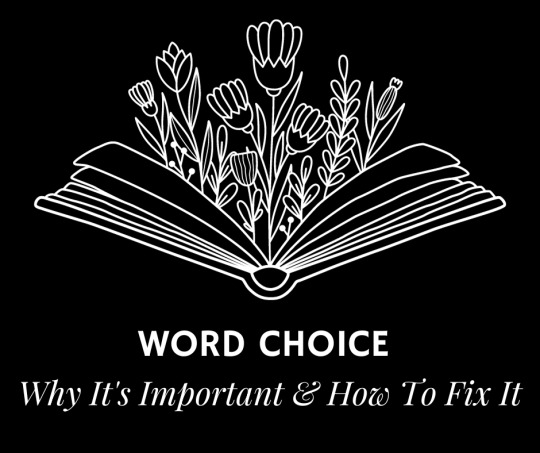
Word choice is very important when it comes to writing. Using the wrong terminology can take a reader right out of the piece and can diminish the impact of the scene that you’re creating. This can be one of the reasons your readers aren’t falling in love with your work.
Find out more here!
#word choice#writing community#creative writing#writeblr#writing#writer stuff#writer#on writing#writers on tumblr#writerscommunity
6 notes
·
View notes
Text
Going on with "Echoes of Eternity".
ADB of Rogal Dorn: "But he ached to fight. He wanted blood on his gauntlets. He wanted to swing his blade and feel the immediacy of victory, of cutting a foe down, of achieving something tactile in this endless grind. The urge was fierce enough to be a constant temptation, but he refused to give in to selfishness".
Me: Rogal dear, is that a bolt pistol in your pocket or do you just wanna fight so bad?
21 notes
·
View notes
Text
it is so painful. to read such a good fic. but the author has a favorite word that they just. wont. stop. using. the entire time my favorite worst enemy professor was in my head saying “pick a new word”. the worst part is it truly is so phenomenally written except for that one thing but that one thing is so fucking grating
#pick a new word#harry potter fanfiction#wolfstar#ao3 fanfic#drarry#harry potter#draco malfoy#scorpius malfoy#ssc#milieu#word choice#english#writing
15 notes
·
View notes